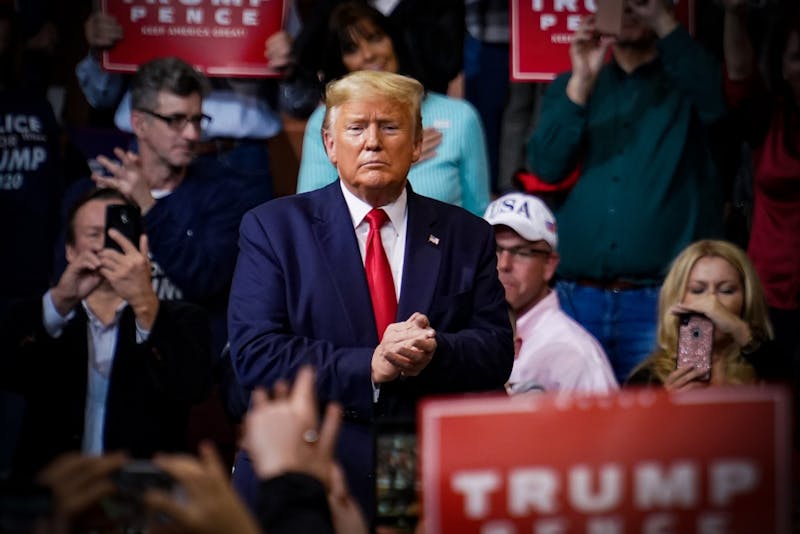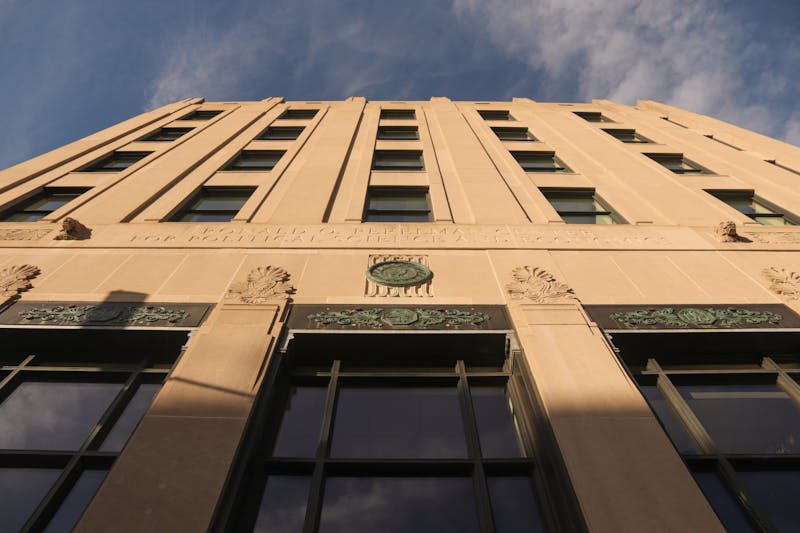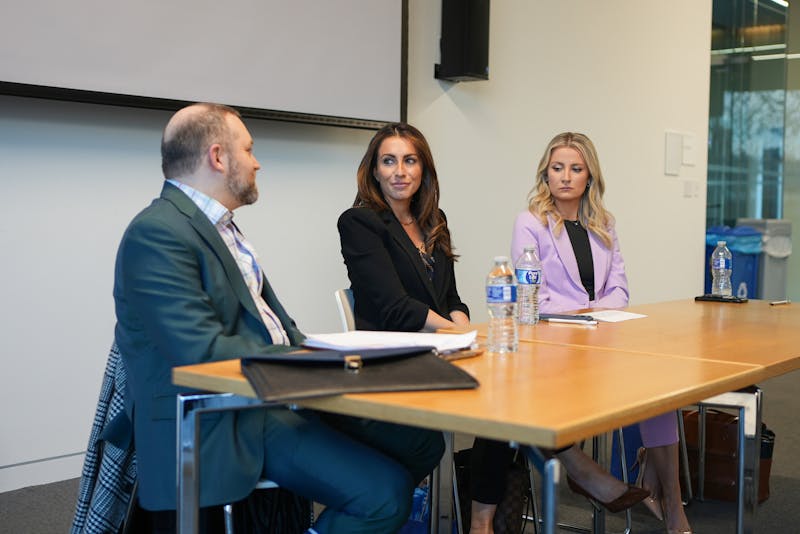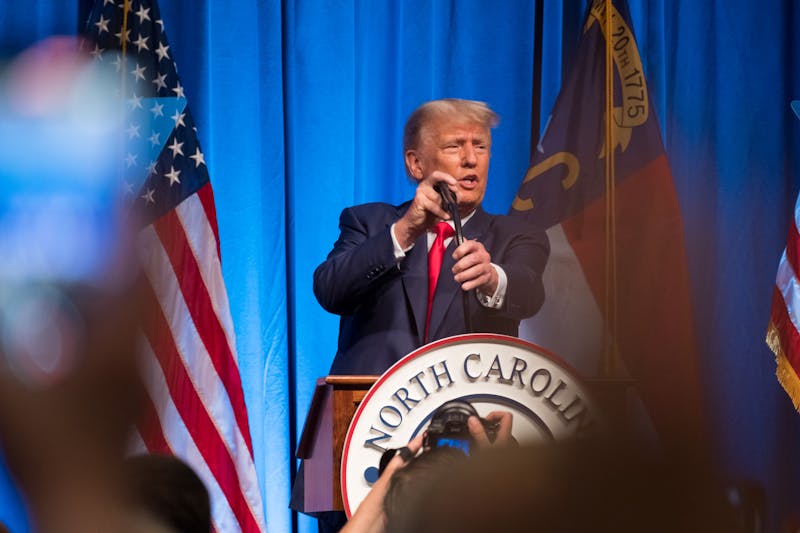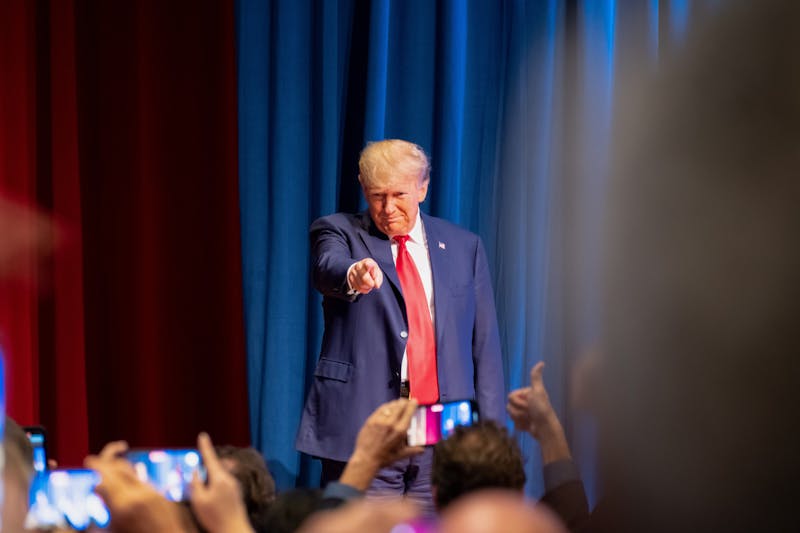
Wharton 1968 graduate and former President Donald Trump was found guilty of falsifying business records on May 30.
Credit: Abhiram JuvvadiMembers of the Penn community have expressed mixed feelings following 1968 Wharton graduate and former President Donald Trump’s conviction on 34 felony counts.
Trump was found guilty of falsifying business records on May 30, making him the first former president to be convicted of a crime. The Daily Pennsylvanian spoke to several students about their reactions to the outcome of the trial.
Reactions to trial results
Many students were surprised that Trump was found guilty on all 34 counts.
“I wasn’t expecting a clean sweep like that,” Penn Democrats Political Director and rising College junior Lucas Eisen told the DP.
Eisen said that he was especially shocked given that a juror said that he obtains his news from Truth Social — Trump's social media platform — and X, the platform formerly known as Twitter, when the jury was asked which media sources they consume most often.
“For them to convict [Trump] on all counts is something really telling that the evidence was so profuse for any biases that [the juror] held,” Eisen said.
Other students immediately felt empowered to use the conviction as part of their arguments to support former Penn Presidential Professor of Practice and current President Joe Biden in the upcoming election.
“As a person who’s very heavily invested in getting Biden elected, I — as a voter — want to spread [the] message that you don’t want a convicted felon in office to other people,” rising College senior Arushi Saxena told the DP.
Mixed feelings over the nature of the trial
Some students felt that the trial was misguided and was only a ploy to attack Trump and undermine his position as a presidential candidate.
Penn College Republicans wrote in a statement to the DP that it is clear “that the former president was being tried explicitly because he was Donald Trump.”
“Placing national political and electoral priorities at the center of state-level prosecutorial questions poses a significant danger to the separation of powers," the College Republicans board wrote, citing the way in which Manhattan District Attorney Alvin Bragg, who is a Democrat, brought on the felony charges.
Other students felt that the trial taking place in New York — a state that is mostly Democratic — could allow Trump supporters to misconstrue the trial and think it was biased.
“The location and the fact that Trump has already sowed these seeds gives him a lot of ammo to tell his supporters that it was a witch hunt,” rising College senior Liam Hoare told the DP.
Trump’s popularity remains consistent
Some students expressed surprise that Trump's conviction has not had a marked impact on his popularity and numbers in the polls.
“Trump demonized [Hillary Clinton] for her shady actions, and that discounted her as a candidate. For him to be the criminal that was convicted and to really not see a dramatic strike in the polls of his popularity is crazy,” Eisen said.
Some even characterized Trump as being seen as invincible by his following.
“It’s kind of funny how according to the law, Trump [potentially] won’t be able to vote for himself, but he can run for the president of the United States. This is so paradoxical,” Saxena said. “There is something about Trump and the persona that he has that even if he does the most notorious thing, it just helps him.”
Students report increased trust in the judicial system
Several students said that the conviction reaffirmed their trust in the judicial system and justice being upheld, even when it involved a former president and current presidential candidate.
Saxena told the DP that the conviction proved “that no one is above the law.”
Many students expressed that the trial was in line with practices of the judicial system, regardless of who was being tried.
“This is simply a case involving [Trump’s] personal life, and he was found guilty, and he's receiving proper punishment for that guidance,” rising College and Wharton first year Arjun Setty said. “I mean, if this [had] happened to anyone else, I don't think it would have made the news.”
Carson Turner and Jason Pang, board members of the University of Pennsylvania Carey Law School American Constitution Society chapter, agreed, writing in a statement to the DP that Trump's trial was “in accordance with the plain letter of the law.”
“The reality is that Donald Trump is a felon who used lies, bribes, and fraud in an attempt to conceal his illicit affair from the voters. He should pay the consequences,” they wrote.
Frustration over Trump fostering distrust of the judicial system
Students also felt that Trump is creating a culture of distrust and rejection toward the judicial system.
“[Trump] and his allies have created a world of alternative facts,” Turner and Pang wrote in their statement.
Setty told the DP that Trump is “dangerous” since he is “continuously attacking a judicial system, with many of whom he had appointed.”
Setty also believes that Trump's rejection of the 2020 election results can be used to predict his actions if he loses the 2024 election following his conviction.
Eisen said that he hopes the American people respect the ruling, even if they do not believe in the judicial system.
Conviction lacks significance
Even as the conviction made history, many students said that they are more interested in the outcome of the presidential election in November.
“To me, the ‘convicted felon status’ matters less than the ‘Trump as president status,’” Hoare said, adding that he believes Trump’s potential sentence will have greater consequences than the conviction itself.
“I’m apprehensive about the effect that this will have on the election, but the sentencing is the date that I’m looking at because that could really change the game,” he said.
Many are also awaiting the results of Trump’s other criminal trials — specifically, two federal trials in Florida and Washington, D.C., and one state trial in Georgia — believing that those verdicts may be more consequential.
Other students mentioned the importance of focusing on the presidential candidates’ stances on political issues — rather than their legal history — when deciding who to vote for.
“We’re in a very precarious state of affairs right now in the United States in terms of foreign policy, trade, and wars, [and] we need to pick the most rational and safe candidate,” Saxena said.
Larger implications of Trump's conviction
Students believe the conviction will set a precedent for holding people in power accountable.
“I think that we can use the conviction as an opportunity to think bigger in terms of … what else can we do to make sure that we hold the people in our [government] accountable,” rising College sophomore Seema Parmar told the DP.
Hoare is more concerned with the implications that the conviction has on changing Congress.
“Trump’s performance will directly affect down ballot races, such as the Senate and the House seats," he said. "I’m looking to see if the Democrats can take back the House this cycle and keep the Senate."
There are no limitations imposed on an individual running for president or any other federal office based on character or criminal record in the U.S. Constitution.
Trump’s sentencing is scheduled for July 11, four days before the start of the Republican National Convention.
Editor's note: After publication, a source requested that some of their quotes be removed. The request was granted by members of DP leadership and the quotes have since been removed, following our company-wide policy on retractions outlined here.
The Daily Pennsylvanian is an independent, student-run newspaper. Please consider making a donation to support the coverage that shapes the University. Your generosity ensures a future of strong journalism at Penn.
Donate







